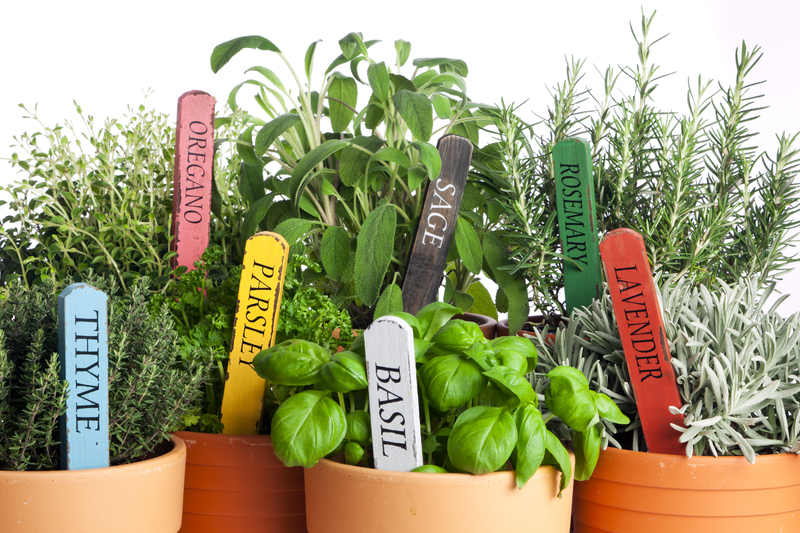Elevate your garden skills with expert herb growing techniques
Posted on 29/09/2025
Elevate Your Garden Skills with Expert Herb Growing Techniques
Herbs are the unsung heroes of the garden--pungent, medicinal, and culinary delights that can bring life to any green space. Whether you're an aspiring gardener or a seasoned grower looking to refine your expertise, mastering expert herb growing techniques will not only elevate your garden but also your kitchen and overall well-being.
Why Focus on Herbs? The Benefits of a Thriving Herb Garden
Herbs are one of the most rewarding plants you can cultivate, offering fragrant foliage, medicinal benefits, and a constant supply of fresh ingredients. Elevating your herb growing skills is about more than just planting seeds--it's about understanding their unique needs and harnessing their full potential.
- Fresh flavor at your fingertips: The difference between dried and fresh herbs is night and day.
- Health benefits: Many herbs have medicinal properties, acting as antioxidants and supporting your immune system.
- Pollinator-attracting: Flowering herbs lure beneficial insects to your garden, enhancing biodiversity.
- Low maintenance: Once established, most herbs are hardy and require minimal care.
- Aesthetic appeal: From feathery dill to purple basil, herbs add texture and color to any landscape.

Expert Herb Growing Techniques: Planning Your Herb Garden
Successful herb gardening begins with strategic planning. The right location, soil, and companion planting tactics make all the difference.
Choosing the Ideal Location
Most herbs thrive in sunny areas, needing 6-8 hours of direct sunlight daily. However, some, like mint and parsley, tolerate partial shade. When selecting a spot, consider existing sunlight patterns and proximity to your kitchen for convenient harvests.
- South-facing beds: Optimal for heat-loving species like rosemary and basil.
- Container gardening: Perfect for balconies or patios--plus, you can move pots to chase the sun.
- Windowsill gardens: Indoors, a bright windowsill provides an easy-access growing area in all seasons.
Soil Preparation and Drainage
Herbs dislike soggy soil. Most varieties demand well-draining earth, as standing water leads to root rot.
- Integrate compost for nutrients and organic matter.
- Improve drainage by adding sand or perlite, especially in heavy clay soils.
- Raised beds or large containers help control moisture more effectively.
Choosing, Sourcing, and Starting Your Herbs
Seeds vs. Transplants
Expert herb growers often use both seeds and nursery transplants. While seeds offer wider selection and lower cost, some herbs--like basil and cilantro--germinate quickly, making them perfect for seed sowing. Others, such as rosemary and lavender, are slow to start and may be easier to grow from starter plants.
- Direct sowing: Grow fast-sprouting herbs like dill, coriander, or basil directly in the garden after frost.
- Transplants: For tougher or slower-growing herbs, purchase healthy nursery starts to jump ahead.
Pro Tips for Propagation
Propagation is a favorite technique among seasoned herb gardeners. Many herbs, such as mint, oregano, and thyme, can be propagated from stem cuttings:
- Snip a 4-inch stem just below a node, remove lower leaves, and root in water or moist potting soil.
- Once rooted, transplant your new herb into the garden or a pot.
- This technique guarantees an identical copy of your favorite plant!
Expert Care and Maintenance: Elevate Your Herb Growing
Watering: The Goldilocks Principle
Avoid overwatering. Most herbs prefer somewhat dry conditions. Water at the base--early in the day is best.
- Let soil dry slightly between waterings; use your finger as a moisture gauge.
- Mulch with straw or bark to retain moisture while preventing fungal spread.
- Pots may require more frequent watering, especially in hot weather.
Fertilizing Herbs: Less Is More
Don't overfeed! High fertilizer levels lead to lush, but bland, foliage. Use compost at planting and side-dress lightly in midsummer if needed.
- Always opt for organic materials like compost or worm castings.
- Avoid nitrogen-heavy fertilizers; too much can decrease essential oil content.
Pruning and Pinching for Maximum Yield
Regular harvesting and pinching encourage bushier plants and more foliage.
- Pinch basil, oregano, and mint tips to prevent flowering and prolong harvest.
- Remove flower buds promptly (unless you want seeds or attract pollinators).
- Cut stems just above a leaf pair to promote new growth.
Pest and Disease Control for Advanced Herb Gardening
Herbs are less prone to pests than veggies, but they're not immune. By using integrated pest management (IPM), you can maintain healthy plants without harsh chemicals.
Natural Defenses
- Beneficial insects: Attract ladybugs and lacewings by letting some herbs flower.
- Companion planting: Pair basil with tomatoes to repel hornworms, or plant chives near roses to deter aphids.
- Neem oil & insecticidal soap: Treat infestations early; always test on a small leaf section first.
Disease Prevention
- Avoid overhead watering--wet foliage fosters fungal diseases.
- Space plants for adequate airflow.
- Rotate crops annually and remove infected leaves promptly.
Mastering Indoor Herb Gardening Techniques
Don't let the weather limit your ambition! With advanced indoor herb growing methods, you can cultivate aromatic greens year-round, even in limited spaces.
Container Selection
- Use pots with ample drainage holes; herbs hate "wet feet."
- Terracotta pots are excellent for breathability but will dry out faster.
- Choose containers at least 6-8 inches deep for root development.
Lighting Mastery
Most indoor herbs need a southern or southwestern window. If sunlight is limited, use full-spectrum LED grow lights set about 6 inches above your herbs for 12-16 hours per day.
Microclimate Tips
- Keep herbs away from chilly drafts or direct heat vents.
- Mist occasionally or use a pebble tray to increase humidity for Mediterranean herbs.
Harvesting for Freshness and Longevity
A well-timed harvest means maximum flavor and productivity! Knowing when and how to pick your herbs is a defining feature of master gardeners.
Harvesting Strategy
- Pick leaves early in the morning, when oils are most concentrated.
- Use sharp, clean scissors to prevent bruising and disease spread.
- Never harvest more than one-third of a plant at a time; allow for regrowth.
Preservation Tips
- Drying: Hang bunches upside down in a dark, airy space or use a basil-friendly dehydrator.
- Freezing: Chop and freeze in ice cube trays with olive oil for instant cooking use.
- Herb vinegars and oils: Infuse your abundance into artisan condiments.
Specialized Techniques: Advanced Herb Gardening Tips
Succession Planting & Year-Round Herbs
For a continuous supply, sow fast-growing herbs like cilantro, basil, and dill every 2-3 weeks throughout your growing season. Utilize cloches or cold frames to extend into autumn or start early in spring.
Soil pH and Customization
- Thyme, rosemary, and lavender dislike acidic soils; lime the soil to raise pH if necessary (aim for 6.5-7.5).
- Parsley and chives are more tolerant of lower pH (down to 6.0).
- Test your soil regularly with a kit, and amend thoughtfully.
Creative Uses for Your Abundant Herb Garden
Once you've mastered expert herb gardening techniques, let your creativity shine:
- Culinary Uses: From chimichurri to herbal butters, fresh herbs transform simple dishes.
- Medicinal Teas: Dry lemon balm, chamomile, and mint for calming teas or herbal tonics.
- Natural Beauty Remedies: Infuse oils for soothing salves or make a clarifying facial steam with rosemary and thyme.
- Home Decor: Wreaths, centerpieces, or fragrant bundles make lovely gifts.
Common Pitfalls to Avoid When Growing Herbs
Even seasoned gardeners can run into trouble. Here are some frequent mistakes to sidestep as you lift your herb growing skills to the next level:
- Overcrowding plants, leading to disease.
- Neglecting soil nutrition and structure.
- Watering inconsistently or in the evening (risking mildew).
- Harvesting too aggressively or infrequently.
- Ignoring pests until they become infestations.

FAQs: Elevating Your Garden with Expert Herb Growing Practices
- Which herbs are easiest for beginners?
Basil, mint, chives, parsley, and thyme are resilient and quick to reward novice gardeners. - How do I get my herbs to grow bushier?
Frequent pinching and not letting them flower will encourage thick, lush growth. - Can I grow herbs year-round?
With the right indoor set-up--good lighting and temperature--you absolutely can grow many herbs all year. - What's the best way to dry herbs?
Air-dry small bundles somewhere dark and warm; use a dehydrator for bulk harvests or thick leaves.
Final Thoughts: Transform Your Garden with Advanced Herb Know-How
Herbs may be humble, but with the right techniques, they'll become the pride of your plot. By using these proven, expert herb growing strategies--planning, propagating, caring, harvesting, and creatively using your bounty--you can truly elevate your garden skills and enjoy a rich, thriving herbal harvest all year round.
Start small, keep experimenting, and let the aromas and flavors of your flourishing herb garden inspire your gardening journey!
Related Searches
- Advanced herb gardening
- Pro tips for growing basil, mint, and rosemary
- How to grow herbs indoors successfully
- Boosting herb yield with expert garden care
- Best soil mixes for herb skills elevation
Latest Posts
Uncover 9 Vital Tips to Boost Your Gardening Skills as a Beginner
Elevate your garden skills with expert herb growing techniques
Winterizing Plants: Strategies for a Cold-Resilient Garden

